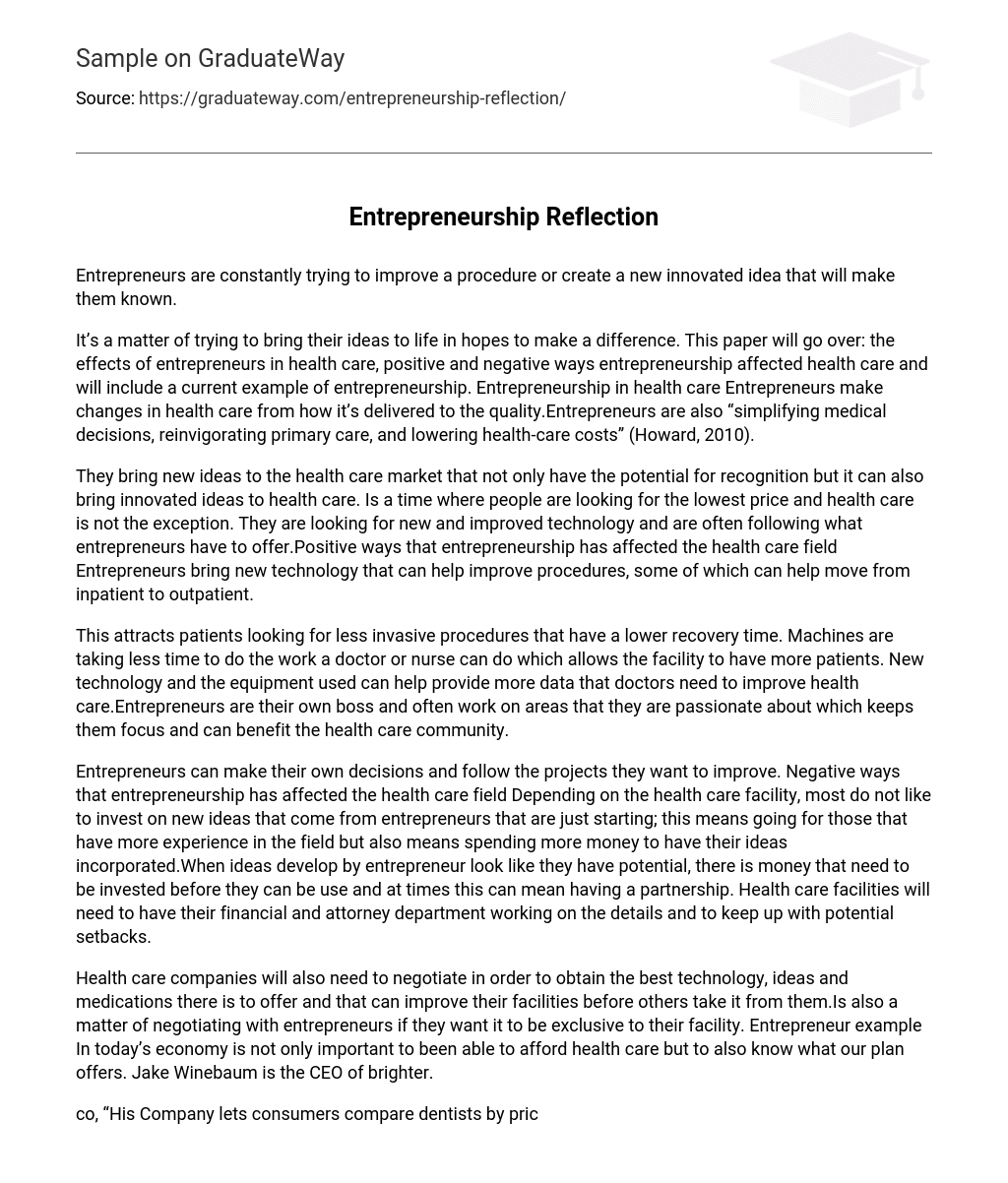Entrepreneurs are always striving to enhance a process or devise a novel innovation that will gain them recognition.
Entrepreneurs in health care strive to transform their ideas into reality in order to have a positive impact. This paper will discuss the impact of entrepreneurs in health care, both beneficial and detrimental, and provide a contemporary example of entrepreneurship. In the field of health care, entrepreneurs bring about changes in delivery methods and improve quality. They also play a role in simplifying medical decisions, rejuvenating primary care, and reducing health-care expenses (Howard, 2010).
Entrepreneurs in the health care market bring innovative ideas that not only have the potential for recognition, but can also improve the field. In today’s cost-conscious society, people are seeking affordable health care options. Entrepreneurs offer new and advanced technology, and their ideas are often adopted by the industry. This has positively impacted the health care field by introducing improved procedures, some of which facilitate the transition from inpatient to outpatient care.
This appeals to patients seeking less invasive procedures with shorter recovery times. Machines are becoming more efficient at performing tasks traditionally done by doctors or nurses, allowing facilities to accommodate more patients. The use of new technology and equipment can provide doctors with additional data to enhance healthcare. Entrepreneurs have the freedom to pursue their own interests, which often leads to a focused approach and benefits the healthcare community.
Entrepreneurs in the health care field possess the freedom to make their own decisions and pursue projects they believe will bring improvements. However, there are negative effects of entrepreneurship in this sector. Many health care facilities are hesitant to invest in new ideas presented by startup entrepreneurs. They prefer to work with individuals who have more experience in the field, even though this may be costlier to incorporate their ideas. When entrepreneurial ideas show promise, financial investments are required for their implementation, which may involve forming partnerships. Consequently, health care facilities must coordinate with their financial and attorney departments to manage the financial and legal intricacies associated with these endeavors and anticipate any potential setbacks.
Health care companies must engage in negotiations to acquire the most advanced technology, innovative ideas, and effective medications that can enhance their facilities before competitors seize the opportunity. It is also essential to negotiate with entrepreneurs if they wish to ensure exclusive access to such resources. For instance, in today’s economy, it is not only crucial to be able to afford health care but also to understand the comprehensive coverage our plan provides. Jake Winebaum serves as the CEO of brighter.
According to Zimmerman (2012), the company offers a service that allows consumers to compare dentists based on their prices and reputation. This service is highly beneficial as it enables patients to compare the offerings and prices of different facilities. As a consumer, this allows me to determine if I can receive the same level of care while also saving money. Additionally, it helps me explore other options available in my area and read reviews from other patients.
This concept is beneficial for various health care aspects, particularly for the elderly. However, a drawback is that internet access is not universally available, requiring dependency on someone who has it, which can be challenging for older individuals. The advantage lies in the ability to gain knowledge about products and make comparisons, yet its usefulness is restricted without internet access. Ultimately, entrepreneurs contribute both positive and negative aspects to the health care field.
Entrepreneurs must prioritize improving healthcare services for the population while considering the challenges involved. It is crucial to identify areas in need of improvement and implement innovative ideas that are not only recognized but also cost-effective for healthcare companies and patients alike.





